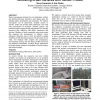Free Online Productivity Tools
i2Speak
i2Symbol
i2OCR
iTex2Img
iWeb2Print
iWeb2Shot
i2Type
iPdf2Split
iPdf2Merge
i2Bopomofo
i2Arabic
i2Style
i2Image
i2PDF
iLatex2Rtf
Sci2ools
137
click to vote
ACMDIS
2010
ACM
2010
ACM
Participatory sensing in public spaces: activating urban surfaces with sensor probes
Recent convergence between low-cost technology, artform and political discourse presents a new design space for enabling public participation and expression. We explore non-experts' use of place-based, modular sensors to activate, author and provoke urban landscapes. Our work with communities of bicyclists, students, parents, and homeless people suggests design opportunities for merging grassroots data collection with public expressions and activism. Members of each community were given probes that represent the measurement of exhaust, smog, pathogens, chemicals, noise or dust, and asked to engage with them as fully functional sensors over the course of one week. Our findings offer insights into participation, environmental sensing, and data sharing within and across four different communities, revealing design implications for future sensing systems as instruments of social currency and political change. Keywords Participatory sensing, public spaces, urban probes
ACMDIS 2010 | Future Sensing Systems | Grassroots Data Collection | Human Computer Interaction | Public Participation |
| Added | 06 Dec 2010 |
| Updated | 06 Dec 2010 |
| Type | Conference |
| Year | 2010 |
| Where | ACMDIS |
| Authors | Stacey Kuznetsov, Eric Paulos |
Comments (0)

